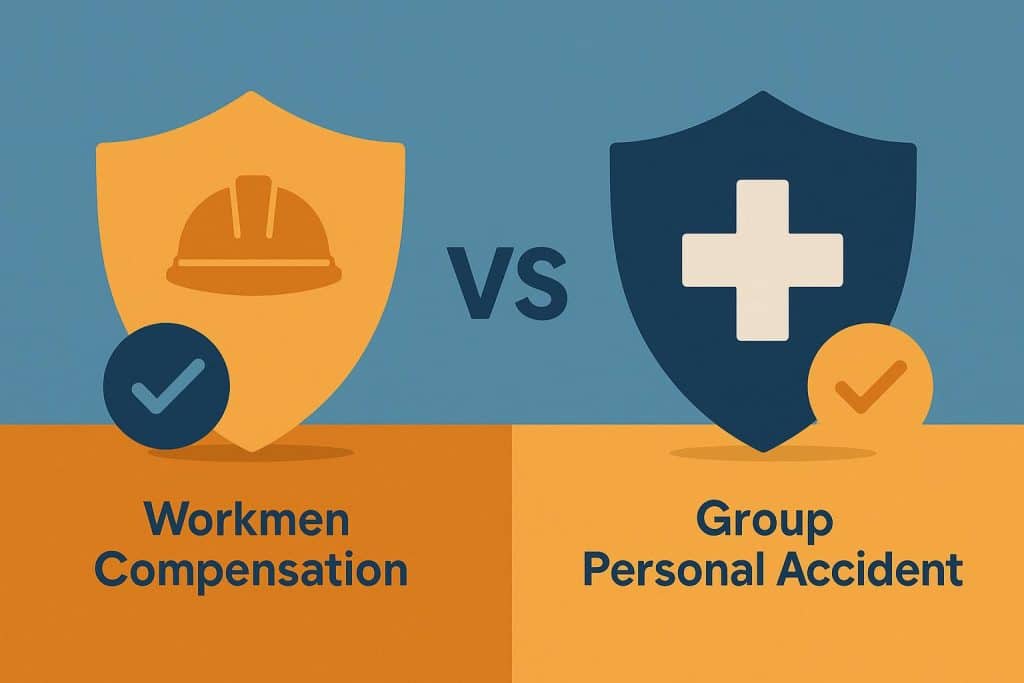As an employer, you must ensure your employees feel secure, especially in high-risk industries like manufacturing. To protect them from workplace injuries or accidents, many businesses opt for employer employee insurance coverage schemes to ensure that any injury or damage done to the employees can be recovered without any hassle.
While discussing employee insurance policies, businesses encounter two options: workmen’s compensation and group personal accident. Though both have benefits and challenges, businesses must explore all the aspects of these policies before they make a decision. This blog explains each type of employer employee insurance policy, guiding you through selecting the right insurance policy for your employees and workers.
Workmen compensation: Covers on-the-job injuries and losses
Workmen compensation, also referred to as WC policy, is an insurance coverage that is mandatory for employers to purchase to offer employees the required protection against workplace accidents. The Workmen’s Compensation Act of 1923 requires businesses with more than 20 employees to purchase this policy, ensuring a safe and secure work environment.
What does it cover?
Through the workmen compensation policy, employers shoulder the responsibility of the workers who trust them and take risks while performing many of their duties. This coverage protects employees against any injuries or physical damage that may happen during the accident or any illnesses that arise due to their workplace conditions.
How does WC policy benefit employees?
This employee insurance coverage offers huge benefits to the employees, including mental peace. Let us see the advantages that it brings to the employees’ and workers’ table:
- It helps employees bear medical expenses, from treatment to hospitalisation to rehabilitation costs.
- It allows employees to receive partial or total wage replacement if they suffer temporary or permanent disability due to a workplace mishap.
- The WC policy allows employees’ dependents to receive financial assistance if the latter dies in a workplace accident.
How does WC policy benefit employers?
The worker’s compensation policy helps employers to:
- Comply with the law and remain protected against the legal liabilities related to workplace mishaps.
- Assure employees that the company is always there to take initiatives for their welfare.
- Manage any unnecessary financial liabilities that may arise later if something goes wrong with employees because of workplace accidents.
Group personal accident – A 24/7 employee insurance coverage
A group personal accident, or GPA policy, is non-legally binding coverage employers offer employees. It provides almost everything that workmen’s compensation does but has a broader scope. Through this coverage policy, employees get both on-the-job and off-the-job protection. Off-the-job scenarios could be situations where employees suffer injuries from work or work-related activity outside the workplace.
What does it cover?
The policy provides coverage against work-related mishaps that cause injuries, disabilities, or even death. For example, if an employee is working in a foreign country for company projects and anything happens there, the employers shoulder the liabilities. If any employee suffers injuries while making to-and-fro movements for work, the injury becomes eligible for coverage under the Group Personal Accident scheme.
How group personal accident policy benefits employer-employee?
Some of the situations in which one can expect compensation under Group Personal Accident enrolment are as follows:
- A lump sum is paid to families if workers or employees die in an accident that occurs while commuting to and from work, workplace leisure activities, etc.
- Employers offer Financial support and assistance in case employees suffer partial or total temporary or permanent disability.
- A daily payment for hospitalisation is made to employees while they undergo their treatment.
Workmen compensation vs group personal accident
Let us compare the two insurance coverages quickly below:
| Parameters | Workmen compensation | Group personal accident |
| Statutory Requirements | Mandated by law under the Workmen Compensation Act 1923 for any business with more than 20 employees/workers | Not mandated by law |
| Coverage offered | Injuries, illnesses and deaths caused in the workplace premises due to an accident | On-the-job coverage is similar to WC policy but offers broader coverage for off-the-job injuries, illnesses and deaths. Off-the-job situations include commuting to work, work-related leisure activities, on-site project executions in a different country, or anything beyond workplace premises but somehow connected to work. |
| Applicable to | Workmen (as defined under the Workmen Compensation Act 1923), workers, employees and staff members from all categories | Includes employees, including non-workmen, executives and management personnel. |
| Influencing factors | Nature of business, type of job profile, payroll expenses of employer | Type of coverage selected, age and occupation of the insured employees and additional benefits mentioned in the coverage. |
Conclusion
Both WC policy and group personal accident coverage offer required protection against mishaps and their repercussions. However, employers must be careful when choosing one for their employees. A workmen compensation policy is ideal if the goal is to prioritise employee safety and strengthen bonds. On the other hand, if the company requires coverage for a broader spectrum of employees, including those at the management level, a Group Personal Accident plan would be a better choice. Study the differences, compare your needs as an employer and decide which one will be better for you and your employees.
Angela Spearman is a journalist at EzineMark who enjoys writing about the latest trending technology and business news.
